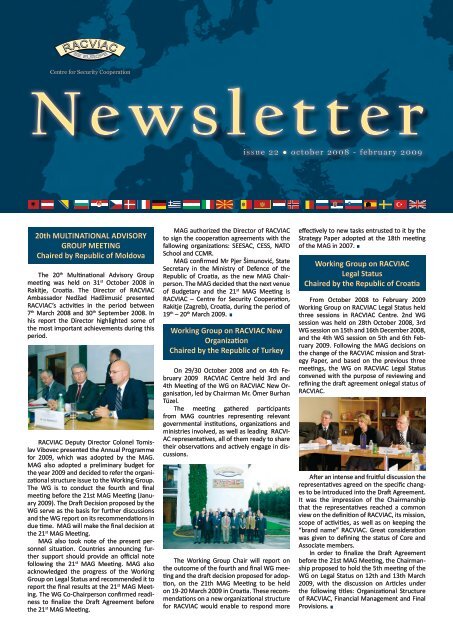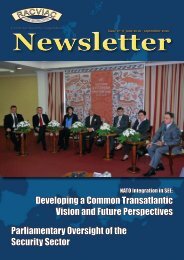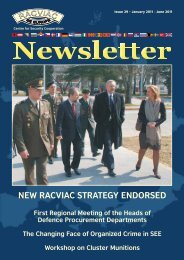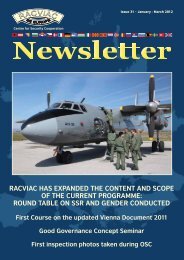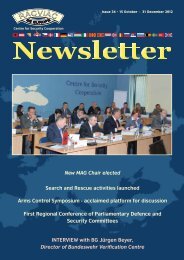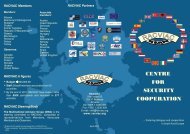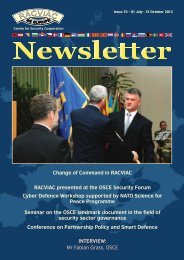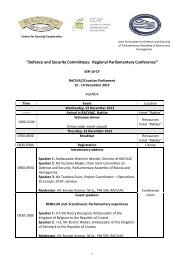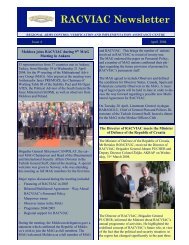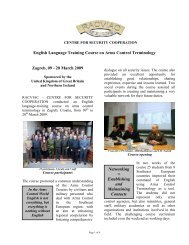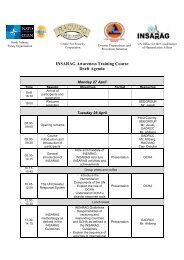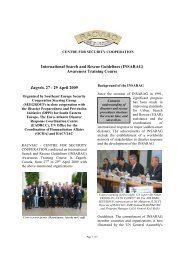20th MULTINATIONAL ADVISORY GROUP MEETING ... - RACVIAC
20th MULTINATIONAL ADVISORY GROUP MEETING ... - RACVIAC
20th MULTINATIONAL ADVISORY GROUP MEETING ... - RACVIAC
Create successful ePaper yourself
Turn your PDF publications into a flip-book with our unique Google optimized e-Paper software.
Newsletter<br />
issue 22 ● october 2008 - february 2009<br />
<strong>20th</strong> <strong>MULTINATIONAL</strong> <strong>ADVISORY</strong><br />
<strong>GROUP</strong> <strong>MEETING</strong><br />
Chaired by Republic of Moldova<br />
The 20 th Multinational Advisory Group<br />
meeting was held on 31 st October 2008 in<br />
Rakitje, Croatia. The Director of <strong>RACVIAC</strong><br />
Ambassador Nedžad Hadžimusić presented<br />
<strong>RACVIAC</strong>’s activities in the period between<br />
7 th March 2008 and 30 th September 2008. In<br />
his report the Director highlighted some of<br />
the most important achievements during this<br />
period.<br />
<strong>RACVIAC</strong> Deputy Director Colonel Tomislav<br />
Vibovec presented the Annual Programme<br />
for 2009, which was adopted by the MAG.<br />
MAG also adopted a preliminary budget for<br />
the year 2009 and decided to refer the organizational<br />
structure issue to the Working Group.<br />
The WG is to conduct the fourth and final<br />
meeting before the 21st MAG Meeting (January<br />
2009). The Draft Decision proposed by the<br />
WG serve as the basis for further discussions<br />
and the WG report on its recommendations in<br />
due time. MAG will make the final decision at<br />
the 21 st MAG Meeting.<br />
MAG also took note of the present personnel<br />
situation. Countries announcing further<br />
support should provide an official note<br />
following the 21 st MAG Meeting. MAG also<br />
acknowledged the progress of the Working<br />
Group on Legal Status and recommended it to<br />
report the final results at the 21 st MAG Meeting.<br />
The WG Co-Chairperson confirmed readiness<br />
to finalize the Draft Agreement before<br />
the 21 st MAG Meeting.<br />
MAG authorized the Director of <strong>RACVIAC</strong><br />
to sign the cooperation agreements with the<br />
fallowing organizations: SEESAC, CESS, NATO<br />
School and CCMR.<br />
MAG confirmed Mr Pjer Šimunović, State<br />
Secretary in the Ministry of Defence of the<br />
Republic of Croatia, as the new MAG Chairperson.<br />
The MAG decided that the next venue<br />
of Budgetary and the 21 st MAG Meeting is<br />
<strong>RACVIAC</strong> – Centre for Security Cooperation,<br />
Rakitje (Zagreb), Croatia, during the period of<br />
19 th – 20 th March 2009.<br />
Working Group on <strong>RACVIAC</strong> New<br />
Organization<br />
Chaired by the Republic of Turkey<br />
On 29/30 October 2008 and on 4th February<br />
2009 <strong>RACVIAC</strong> Centre held 3rd and<br />
4th Meeting of the WG on <strong>RACVIAC</strong> New Organisation,<br />
led by Chairman Mr. Ömer Burhan<br />
Tüzel.<br />
The meeting gathered participants<br />
from MAG countries representing relevant<br />
governmental institutions, organizations and<br />
ministries involved, as well as leading RACVI-<br />
AC representatives, all of them ready to share<br />
their observations and actively engage in discussions.<br />
The Working Group Chair will report on<br />
the outcome of the fourth and final WG meeting<br />
and the draft decision proposed for adoption,<br />
on the 21th MAG Meeting to be held<br />
on 19-20 March 2009 in Croatia. These recommendations<br />
on a new organizational structure<br />
for <strong>RACVIAC</strong> would enable to respond more<br />
effectively to new tasks entrusted to it by the<br />
Strategy Paper adopted at the 18th meeting<br />
of the MAG in 2007.<br />
Working Group on <strong>RACVIAC</strong><br />
Legal Status<br />
Chaired by the Republic of Croatia<br />
From October 2008 to February 2009<br />
Working Group on <strong>RACVIAC</strong> Legal Status held<br />
three sessions in <strong>RACVIAC</strong> Centre. 2nd WG<br />
session was held on 28th October 2008, 3rd<br />
WG session on 15th and 16th December 2008,<br />
and the 4th WG session on 5th and 6th February<br />
2009. Following the MAG decisions on<br />
the change of the <strong>RACVIAC</strong> mission and Strategy<br />
Paper, and based on the previous three<br />
meetings, the WG on <strong>RACVIAC</strong> Legal Status<br />
convened with the purpose of reviewing and<br />
refining the draft agreement onlegal status of<br />
<strong>RACVIAC</strong>.<br />
After an intense and fruitful discussion the<br />
representatives agreed on the specific changes<br />
to be introduced into the Draft Agreement.<br />
It was the impression of the Chairmanship<br />
that the representatives reached a common<br />
view on the definition of <strong>RACVIAC</strong>, its mission,<br />
scope of activities, as well as on keeping the<br />
“brand name” <strong>RACVIAC</strong>. Great consideration<br />
was given to defining the status of Core and<br />
Associate members.<br />
In order to finalize the Draft Agreement<br />
before the 21st MAG Meeting, the Chairmanship<br />
proposed to hold the 5th meeting of the<br />
WG on Legal Status on 12th and 13th March<br />
2009, with the discussion on Articles under<br />
the following titles: Organizational Structure<br />
of <strong>RACVIAC</strong>, Financial Management and Final<br />
Provisions.
Visits to <strong>RACVIAC</strong><br />
Mr Jose Pedro Torrubia Assenjo, Deputy<br />
Head of Mission in the Spanish Embassy in<br />
Zagreb, Croatia, visited <strong>RACVIAC</strong> – Centre for<br />
Security Cooperation on 2 nd October 2008.<br />
<strong>RACVIAC</strong> signed MoU with CESS<br />
On 13 th November 2008 Ambassador<br />
Nedžad Hadžimusić, <strong>RACVIAC</strong> Director, and Dr.<br />
Willem Frederic van Eekelen, Chairman of the<br />
Board of the Centre for European Security<br />
Studies, Groningen, signed Memorandum of<br />
Understanding between <strong>RACVIAC</strong> and CESS.<br />
Netherlands Ambassador H.E. Mrs Catharina<br />
Maria Trooster and Netherlands Defense Attaché<br />
Lieutenant Colonel F. J. Besselink were<br />
also present at the signing of MoU.<br />
was signed, Ambassador Nedžad Hadžimusić<br />
expressed, in a brief statement, his gratitude<br />
for the deepening of the established cooperation<br />
with CCMR in exchanging experience and<br />
expertise in the field of security sector reform<br />
and Euro-Atlantic integration, by developing<br />
joint initiatives, research, educational and advocacy<br />
projects in the South-East European<br />
region.<br />
Mr Assenjo was hosted by the Director<br />
Ambassador Nedžad Hadžimusić who accompanied<br />
him to the briefing room where<br />
Mr Assenjo was provided with a briefing on<br />
structure, objectives and activities of RACVI-<br />
AC.<br />
On 3 rd November 2008 Admiral Marcantonio<br />
Trevisani, Director of CASD (Italian<br />
Centre for High Defense Studies), and Captain<br />
Roberto Domini, Italian Defense Attaché<br />
in Croatia, visited <strong>RACVIAC</strong> – Centre for Security<br />
Cooperation.<br />
The honorable guests were hosted<br />
by the Director of <strong>RACVIAC</strong> Ambassador<br />
Nedžad Hadžimusić. Italian delegation was<br />
provided with a short briefing on <strong>RACVIAC</strong><br />
activities. Both organizations expressed<br />
readiness for future cooperation.<br />
On 3 rd November 2008 <strong>RACVIAC</strong> hosted<br />
Major General Johann Pucher, Chief of<br />
Directorate for Security Policy of Austrian<br />
MOD, formerly the Director of <strong>RACVIAC</strong>, and<br />
Brigadier General Manfred Sulzgruber, Austrian<br />
Military Attaché in Croatia.<br />
The ceremony was held during the RACVI-<br />
AC Seminar on “Parliamentary Oversight of<br />
the Security Sector”, which took place from<br />
12th - 14th November 2008. Director of<br />
<strong>RACVIAC</strong>, Ambassador Nedžad Hadžimusić<br />
expressed his gratitude to the representatives<br />
of CESS for enhancing an already fruitful cooperation<br />
with CESS by signing this MOU, thus<br />
improving the assistance to the security sector<br />
and defence reform (SSR) ass well as to defence<br />
institution building (DIB) of South-East<br />
European countries.<br />
Dr. Willem Frederic van Eekelen, Chairman<br />
of the Board, CESS, confirmed the readiness<br />
of the Centre to further support <strong>RACVIAC</strong> as<br />
an indispensable contributor to cooperative<br />
security efforts in the ever-greater process of<br />
a genuine regional ownership.<br />
MoU signed with CCMR and with<br />
SEESAC<br />
Ambassador Nedžad Hadžimusić, the Director<br />
of <strong>RACVIAC</strong> - Centre for Security Cooperation,<br />
accompanied by LtCol Thomas<br />
MERGEL, Planning and Liaison Officer, paid an<br />
official working visit to Belgrade on 21st November<br />
2008.<br />
In the bases of UNDP Serbia, where the<br />
signing ceremony of the MOU with SEESAC<br />
took place, Ambassador Nedžad Hadžimusić<br />
particularly underlined the fact that through<br />
this MOU both organizations are reaffirming<br />
and strengthening the well established cooperation<br />
by reflecting the changed name,<br />
mission and objectives of both organizations,<br />
as well as by providing a forum for regional<br />
dialogue and co-operation in the field of small<br />
arms and light weapons on the following issues:<br />
capacity building, public awareness and<br />
promotion of dialogue, regional harmonization<br />
of legislation including arms export legislation.<br />
Ambassador Hadžimusić emphasized<br />
that all of the abovementioned is happening<br />
exactly at a time when <strong>RACVIAC</strong>, in its new<br />
concept, asks for redefinition of partnership<br />
between the countries of the region and their<br />
international partners. This includes outfitting<br />
<strong>RACVIAC</strong> as an indispensable contributor to<br />
cooperative security efforts in the region.<br />
<strong>RACVIAC</strong> signed MoU with UNICRI<br />
<strong>RACVIAC</strong> – Centre for Security Cooperation<br />
and UNICRI - United Nations Interregional<br />
Crime and Justice Research Institute signed<br />
the Memorandum of Understanding.<br />
Ambassador Nedžad Hadžimusić, Director<br />
of <strong>RACVIAC</strong> - Centre for Security Cooperation,<br />
and Mr. Alessandro Calvani, Director of the<br />
United Nations Interregional Crime and Justice<br />
Research Institute, signed the document<br />
on 17 th December 2008 in Turin, Italy.<br />
The guests were welcomed by Director<br />
Ambassador Nedžad Hadžimusić, Lieutenant<br />
Colonel Manfred Bluemmel and other from<br />
<strong>RACVIAC</strong> staff.<br />
2<br />
The purpose of the visit was to sign the<br />
Memorandum of Understanding (MOU) with<br />
the Centre for Civil-Military Relations (CCMR)<br />
and with the South Eastern and Eastern Europe<br />
Clearinghouse for the Control of Small<br />
Arms and Light Weapons (SEESAC). In the<br />
bases of CCMR Belgrade, where the MOU<br />
Mr Calvani and Ambassador Hadžimusić<br />
expressed their great expectations regarding<br />
future cooperation between the two organizations.
Conflict Prevention Seminar<br />
<strong>RACVIAC</strong> Conflict Prevention Seminar<br />
took place from 12th – 14th October 2008 in<br />
Rakitje, Croatia. During the two-day seminar<br />
international experts shared their experience,<br />
knowledge and expertise, evoking lively interest<br />
among participants.<br />
The seminar objectives were as follows:<br />
to discuss different definitions of conflict<br />
prevention; to provide the participants with<br />
a toolbox for critical examination of different<br />
conflicts and with the possible application<br />
of different approaches on how to handle<br />
conflicts; to examine how the international<br />
bodies approach the CP issue; to analyze the<br />
importance of preventive policies; to present<br />
lessons learned about preventing conflict in<br />
the SEE; to discuss the role of media in the CP<br />
cycle.<br />
Thirty five participants from the ministries<br />
and institutions of 7 countries participated<br />
in the Seminar. The Seminar was also open<br />
to participation of scholars, research fellows,<br />
graduate students of Political Science and International<br />
Relations.<br />
Professor Stefan Wolff illustrated the relationship<br />
between the why (aims) and the<br />
when (timing) of any intervention, the options<br />
available to the intervening party, and their<br />
likelihood to succeed. He also mentioned how<br />
security threats presented by conflict within<br />
(and between) states, as well as widespread<br />
public demand to ‘do something’ about this,<br />
pose a continuing challenge for regional and<br />
international organisations and their member<br />
states.<br />
Mr Gerd Hagmeyer-Gaverus illustrated<br />
SIPRI project “An Internet-Based Early Warning<br />
Indicators System for Preventive Policy”<br />
and the ideas to build an Internet based Early<br />
Warning System in order to achieve accurate<br />
short-term early warning on conflicts and humanitarian<br />
crises, including ethnic-political<br />
conflicts, genocides, inter- and intrastate conflicts.<br />
Mr. Zachary Taylor displayed the role of<br />
UNDP in promoting prevention and peace<br />
building, as well as reducing and averting conflict.<br />
He stressed that development of skills<br />
among key stakeholders enabled them to convene<br />
problem-solving discussions as an alternative<br />
to violence.<br />
Mr. Loda explained the OSCE conflict prevention<br />
tools, which include regular political<br />
dialogue and exchange of views among OSCE<br />
participating States in the Permanent Council,<br />
the network of OSCE field missions and other<br />
field activities (currently 20 different operations)<br />
and permanent Institutions.<br />
Prof. Kriendler described the mechanisms<br />
of NATO crisis management and conflict manage-ment,<br />
highlighting in his conclusion some<br />
of the key challenges. During this seminar the<br />
cooperation with the international community<br />
was further strengthened.<br />
Desk-to-desk meetings, staff-to-staff consultations<br />
between different partners, and<br />
cooperation with regional organizations in the<br />
field were evoked, stressed and requested by<br />
all participants during the final discussion.<br />
Seminar on Marking and Tracing as<br />
Control Measures to Prevent and<br />
Combat Trafficking in Small Arms and<br />
Light Weapons (SALW)<br />
<strong>RACVIAC</strong> – Centre for Security Cooperation<br />
in close collaboration with the Croatian<br />
Customs Directorate and Ministry of Interior<br />
of the former Yugoslav Republic of Macedonia<br />
1 conducted the seminar on Marking and<br />
Tracing as Control Measures to Prevent and<br />
Combat Trafficking in Small Arms and Light<br />
Weapons (SALW) in Zagreb, Croatia from 15th<br />
- 17th October 2008.<br />
This seminar served as a training forum<br />
directed mainly towards sharing experiences<br />
and lessons learned, new methods, techniques<br />
and ideas by those involved in preventing<br />
and combating the illicit manufacturing<br />
and trafficking in firearms and ammunition in<br />
the Southeast European countries, as well as<br />
towards identifying means and ways on how<br />
to improve and harmonize the processes of<br />
curbing the smuggling of the SALW in each<br />
country, and encouraging regional cooperation.<br />
The seminar gathered thirty-four participants<br />
with knowledge and experience in the<br />
field of SALW from fifteen countries, representing<br />
relevant ministries, agencies and institutions<br />
directly involved in the process of<br />
the prevention and combat of the trafficking<br />
in SALW. During the two-day seminar the multinational<br />
participants and experts provided<br />
insight into the regional problem of SALW trafficking,<br />
regional and international techniques<br />
methods, approaches, practices, norms and<br />
standards implemented and used in prevent-<br />
1 Turkey recognizes the Republic of Macedonia<br />
with its constitutional name<br />
Visits to <strong>RACVIAC</strong><br />
German Army Chief Lieutenant General<br />
Hans-Otto Budde visited <strong>RACVIAC</strong> – Centre<br />
for Security Cooperation on 7 th November<br />
2008. Lieutenant Colonel Burkhard Kuhnappfel,<br />
German Defence Attache in Croatia, accompanied<br />
Lt Gen Budde in this visit.<br />
Lt Gen Budde was hosted on behalf of<br />
all <strong>RACVIAC</strong> Staff by Director Ambassador<br />
Nedžad Hadžimusić and Deputy Director<br />
and Chief of Staff Colonel Tomislav Vibovec.<br />
<strong>RACVIAC</strong> Chief Planning & Liaison Officer for<br />
Western Europe and International Organisations<br />
LtCol Thomas Mergel held a brief presentation<br />
on <strong>RACVIAC</strong> mission, activities and<br />
structure. German Army Chief expressed his<br />
gratitude for the warm welcome, and also<br />
his satisfaction with the progress in activities<br />
of <strong>RACVIAC</strong>.<br />
On 10th November 2008 the delegation<br />
from Croatian Regional Centre for Assistance<br />
and Disaster Relief visited <strong>RACVIAC</strong> – Centre<br />
for Security Cooperation. The delegation<br />
consisted of Mr Ranko Britvic, Director of<br />
the Centre, and Mr Stiven Vladislavic, Head<br />
of the Department of Planning, Operative,<br />
Logistic and Analysis Activities.<br />
They were welcomed by the Director<br />
of <strong>RACVIAC</strong> Ambassador Nedzad Hadzimusic<br />
and Deputy Director Colonel Tomislav<br />
Vibovec. <strong>RACVIAC</strong> PR Officer 1st Lieutenant<br />
Igor Skenderovic held a presentation<br />
on <strong>RACVIAC</strong>’s mission and activities, while<br />
Croatian Regional Centre for Assistance and<br />
Disaster Relief delegation presented their<br />
objectives and activities to <strong>RACVIAC</strong> Staff.<br />
3
Visits to <strong>RACVIAC</strong><br />
On 11th December 2008 the representatives<br />
of Croatian Ministry of Defence and<br />
Ministry of Foreign Affairs and European Integration<br />
visited <strong>RACVIAC</strong> – Centre for Security<br />
Cooperation.<br />
ing and combating the smuggling of the guns<br />
and ammunitions.<br />
Subsequently, all the participants discussed<br />
the positive and negative sides of the<br />
existing systems in each country. Ambassador<br />
Nedžad Hadžimusić, Director of <strong>RACVIAC</strong>,<br />
opened the Seminar on Thursday, 16th October,<br />
by welcoming all seminar participants<br />
very heartily and stressing various new challenges<br />
that the international community has<br />
to confront today. He emphasized that those<br />
challenges could only be addressed through<br />
concerted efforts, deeply appreciating the<br />
proponents of this Seminar.<br />
Over 70% of the participants expressed a<br />
strong interest in a more practical approach<br />
to the SALW proliferation process and stricter<br />
restrictions when purchasing arms and ammunitions.<br />
Thus we should consider inviting<br />
the representatives from the regional or international<br />
weapons manufacturing firms, agencies<br />
and factories to participate in the SALW<br />
seminars in order to contribute to the search<br />
of possible solutions. Participants expressed a<br />
request to explore national approaches in the<br />
field of SALW in more detail in the future.<br />
Towards OSLO 2008: Workshop on<br />
Cluster Munitions<br />
Delegation of the Croatian Ministry of<br />
Defense and Foreign Affairs consisted of: Mr<br />
Pjer ŠimunoviĆ, State Secretary in MoD and<br />
MAG Chairman, Mr Mario Nobilo, Assistant<br />
Minister in MFAEI, and Mr Andrej Dogan,<br />
Chief of Department for International Security<br />
Policy, MFAEI.<br />
The visitors were hosted by the Ambassador<br />
Nedžad Hadžimusić, Director of<br />
<strong>RACVIAC</strong>, Lieutenant Colonel Thomas Mergel,<br />
Chief of Planning & Liaison Divison and<br />
Mrs Glorija Ivković, MAG Secretary.<br />
On 9th February 2009 <strong>RACVIAC</strong> – Centre<br />
for Security Cooperation was honored by the<br />
visit of Colonel Christos Pantzias, Defense<br />
Attache of Hellenic Republic in Croatia. Colonel<br />
Christos Pantzias was accompanied by<br />
Assistant of Defence Attache of Hellenic Republic<br />
in Croatia 1stLT Andreas Bourdaniotis.<br />
After the welcome reception in the<br />
Office of Director, Ambassador Nedžad<br />
Hadžimusić, Mr Pantzias was hosted by<br />
Deputy Director and Chief of Staff Colonel<br />
Tomislav Vibovec and <strong>RACVIAC</strong> senior staff<br />
members. Later on Press & PR Officer 1stLT<br />
Igor Skenderović held a brief presentation<br />
on <strong>RACVIAC</strong> Mission, programme of activities,<br />
and on the ongoing transformation of<br />
the Centre’s structure and its legal status.<br />
4<br />
The first day of the seminar was directed<br />
towards a more theoretical approach and was<br />
fully covered by presentations reflecting the<br />
main tools and mechanisms used in preventing<br />
the trafficking of SALW, such as marking<br />
and tracing, arms and ammunitions registration<br />
system, as well as relevant documents<br />
and legal instruments.<br />
The plenary sessions ensured a successful<br />
interaction between the participants, lecturers<br />
and experts. It was obvious that all the<br />
participants shared a common understanding<br />
of the principles, methods and techniques,<br />
which are used to prevent and combat trafficking<br />
in small arms and light weapons.<br />
The second day of the seminar comprised<br />
training directed mainly at introducing the<br />
participants with the Croatian approach to<br />
trafficking in small arms and light weapons. It<br />
was organized and conducted at the Croatian<br />
Customs Boarder crossing point Bregana.<br />
The Bregana head officers: Stjepan Stilinović,<br />
Head of the Border Crossing Point (Customs),<br />
Andrej Rainović, Head of the Division (Police),<br />
and Željko Bistrović, Head of the Shift (Customs),<br />
introduced the participants with the<br />
unit history.<br />
They provided the statistics and the overall<br />
information about their day-to-day duties<br />
and activities. During this part, the participants<br />
very actively engaged in asking questions.<br />
The answers provided were directed<br />
mainly to the practical part and exchange in<br />
experience, covering a full range of the issues<br />
related to the SALW such as smuggling, marking,<br />
tracing, legal instruments, stockpile management,<br />
import, export, and a lot of other<br />
issues related to the arms and ammunition<br />
proliferation.<br />
According to the 2008 <strong>RACVIAC</strong> programme,<br />
the Training & Verification Division<br />
organized and carried out the Workshop “Towards<br />
OSLO 2008: Workshop on Cluster Munitions”<br />
(C-07), from 21st - 24th October 2008.<br />
The purpose of this Workshop was to get<br />
the participants acquainted with the Convention<br />
on Cluster Munitions adopted in Dublin<br />
on 30th May 2008 by 123 governments. The<br />
Workshop comprised presentations, which<br />
provided the participants with all the necessary<br />
information about the Convention on<br />
Cluster Munitions and the aspects it covered,<br />
followed by intense and lively discussions.<br />
Workshop objectives were as follows: to<br />
inform the participants on various aspects of<br />
cluster munitions (Technological characteristics<br />
and Humanitarian impact); to inform the<br />
participants about the nature of the Convention<br />
(Security aspects and Human Rights issues);<br />
to provide a forum for discussion on<br />
the abovementioned issues in the context of<br />
Disarmament and Humanitarian Law, in view<br />
of the growing effectiveness of non-traditional<br />
diplomacy.<br />
Altogether 30 participants and lecturers,<br />
representing 23 countries or organizations<br />
attended the Workshop. Participants were<br />
namely from: Albania, Bosnia and Herzegovina,<br />
Croatia, Former Yugoslav Republic of Macedonia<br />
1 , France, Moldova, Serbia, Slovenia,<br />
Turkey, Arbeiter Samariter Bund (ASB) and<br />
ARESA/Denmark.<br />
1 Turkey recognizes the Republic of Macedonia<br />
with its constitutional name
The lecturers came from: Austria, Bosnia<br />
and Herzegovina, Bulgaria, Croatia, Norway,<br />
Serbia, Geneva International Centre for Humanitarian<br />
Demining (GICHD), Handicap International,<br />
ITF/ Slovenia, Norwegian People’s<br />
Aid/ Serbia, NAMSA/NATO and UN Mine Action<br />
Service.<br />
This was the first time that <strong>RACVIAC</strong> organized<br />
an activity related to Cluster Munitions.<br />
It proved to be a successful and timely<br />
choice, just before the Convention on Cluster<br />
Munitions opened in Oslo, Norway, on 2-3 December<br />
2008.<br />
Sixteen years after the first rapprochement<br />
between Western Balkans and NATO, i.e. Albania’s<br />
accession to North Atlantic Cooperation<br />
Council in 1992, the Alliance has opened<br />
the doors for the sixth enlargement. Albania,<br />
Croatia, and the Former Yugoslav Republic of<br />
Macedonia 1 , on condition of an agreement on<br />
its constitutional name with Greece, were invited<br />
to start accession talks with the Alliance<br />
at the 2008 Bucharest Summit.<br />
Visits outside <strong>RACVIAC</strong><br />
<strong>RACVIAC</strong> Director Ambassador Nedžad<br />
Hadžimusić, represented <strong>RACVIAC</strong> at the<br />
Visitors Day of Seven Stars 08 - Peace Support<br />
Operation exercise held in Multinational<br />
Peace Force South Eastern Europe Brigade<br />
(SEEBRIG) HQ in Istanbul, Turkey, on 14th<br />
November 2008.<br />
SEEBRIG Commander Brigadier General<br />
Virgil Balaceanu held the welcome speech<br />
and explained the Seven Stars 08 purpose<br />
and objectives to the visitors.<br />
Colonel Tomislav Vibovec, Deputy Director<br />
of <strong>RACVIAC</strong>, and Ambassador Davor<br />
Božinović, State Secretary for European Integration<br />
in the Ministry of Foreign Affairs<br />
and European Integration of the Republic of<br />
Croatia, opened the workshop.<br />
The 1st segment (Day 1) examined the<br />
background: i.e. the impetus for the Convention<br />
or why it came into being. Also, it focused<br />
on the steps leading to the Dublin Diplomatic<br />
Conference; i.e. how it came into being. The<br />
perspective that was given was from the core<br />
parties in the convention making process,<br />
both governmental and non-governmental.<br />
The 2nd segment (second parts of Day 1<br />
and Day 2) focused on the theoretical issues<br />
and on-the-ground experience in cluster munitions,<br />
presented and examined by international<br />
experts.<br />
During the 3rd segment (Day 3) a panel of<br />
national and international NGOs representatives<br />
shared their insights and experience on<br />
mine clearance and victim assistance.<br />
According to the participants` assessments<br />
at the end of the event, the workshop<br />
proved to be a successful, very interesting,<br />
well organized, and valuable event. They all<br />
agreed on the necessity of conducting such<br />
kinds of workshops in the future, aimed at<br />
contributing to the security and confidence<br />
building measures in the region.<br />
Promoting Southeast Europe –<br />
NATO Integration<br />
According to its 2008 Annual Programme,<br />
<strong>RACVIAC</strong> – Centre for Security Cooperation<br />
held a seminar on Promoting Southeast Europe<br />
NATO Integration, which took place from<br />
4th - 6th November 2008 in Rakitje, Vitez<br />
Damir Martić military barracks.<br />
The aim of the seminar was to promote<br />
cooperation between NATO and Southeast<br />
Europe through projections on short-term<br />
and mid-term political developments in the<br />
region. During this seminar international and<br />
regional experts shared their experience,<br />
knowledge and expertise, evoking lively interest<br />
among participants.<br />
The seminar was organized on a high profile<br />
following the 2008 Bucharest Summit.<br />
In order to fulfil the purpose, seminar set<br />
the following objectives: to describe security<br />
challenges in the region; to stress advantages<br />
of cooperation on the regional and global<br />
level; to highlight efforts of the countries in<br />
the region on their way to NATO integration;<br />
to foresee the future prospect of Southeast<br />
Europe in the realm of security, and to anticipate<br />
possible ways of increasing cooperation<br />
between the Alliance and countries of the region.<br />
The seminar gathered sixty-two participants<br />
from ten countries with knowledge and<br />
expertise in Euro-Atlantic integration process,<br />
representing relevant ministries, agencies,<br />
international organizations, and academic institutions<br />
directly or indirectly involved in the<br />
integration process.<br />
During the two-day seminar a multinational<br />
expert team from NATO provided background<br />
analysis for participants through presentations<br />
and mediation during panels. They<br />
demonstrated a glimpse into NATO’s evolving<br />
role in the realm of security on global level<br />
and more particularly in Southeast Europe.<br />
Additionally, countries` representatives at the<br />
ministerial and ambassadorial level had the<br />
opportunity to share their countries` experiences<br />
in relation to NATO.<br />
Two Round Tables informed the audience<br />
and provided the platform for discussion with<br />
regard to the enlargement to 2008 Bucharest<br />
Summit invitees, and Partnership for Peace<br />
countries. Ambassador Nedžad Hadžimusić,<br />
Director of <strong>RACVIAC</strong>, opened the seminar by<br />
welcoming all seminar participants very heartily.<br />
He stressed the importance of the proper<br />
timing of the seminaar and drew a spotlight<br />
on the NATO aspirants. H.E. Mr Hikmet Çetin<br />
gave a keynote speech, in which he provided<br />
1 Turkey recognizes the Republic of Macedonia<br />
with its constitutional name<br />
Ambassador Hadžimusić and other delegates<br />
visited the Tactical OPS Centre, Planning<br />
group and Sections, the Response Cell,<br />
CIS Facilities, and PIC and CIMIC Centre.<br />
Ambassador Nedžad Hadžimusić, the<br />
Director of <strong>RACVIAC</strong> - Centre for Security<br />
Cooperation, paid an official working visit<br />
to the Republic of Albania from 18th - 21st<br />
December 2008. The official meetings were<br />
held at the Ministry of Defence with Ms.<br />
Zana Xhuka, Deputy Minister of Defence,<br />
Brigadier General Zyber Dushku, Deputy<br />
Chief of General Staff of Albanian Armed<br />
Forces, Ambassador Idriz Konjari, Director of<br />
Euro-Atlantic Integration and Defence Policy<br />
Directorate, Prof. Ass. Dr. Elmaz Leci, Rector<br />
of the Military University “Skenderbej”, as<br />
well as at the Ministry of Foreign Affairs of<br />
the Republic of Albania.<br />
The Albanian authorities appreciated<br />
the successful cooperation with <strong>RACVIAC</strong><br />
and reiterated the support of Albania for the<br />
Centre’s transformation process into RACVI-<br />
AC - Centre for Security Cooperation. They<br />
also expressed Albania’s readiness to fulfil<br />
all the obligations related to regional initiatives,<br />
both in the form of funds and qualified<br />
personnel.<br />
Ambassador Hadžimusić stressed the<br />
high importance of Albania and Croatia’s<br />
soon NATO membership, which would positively<br />
influence the security in the SEE region.<br />
In that regard, he offered <strong>RACVIAC</strong> as<br />
facilitator for the best promotion of Albania<br />
and Croatia’s NATO membership following<br />
the next NATO Summit.<br />
At the meeting with Ms. Zana Xhuka,<br />
Deputy Minister of Defence, the attendees<br />
expressed the readiness to exchange lecturers<br />
in <strong>RACVIAC</strong> activities, as well as in the<br />
Senior Course on Security and Defence Studies,<br />
which has been and will continue to be<br />
organised by Albania, with the active participation<br />
of the countries from the region.<br />
5
Visits outside <strong>RACVIAC</strong><br />
From 10th to 12th February 2009 the<br />
<strong>RACVIAC</strong> – Centre for Security Cooperation<br />
delegation visited NATO School in Oberammergau<br />
and George C. Marshall European<br />
Center for Security Studies in Garmisch-<br />
Partenkirchen, Germany.<br />
The purpose of the trip was to consult<br />
with the commandant of NATO School and<br />
to take advantage from Marshall Center’s<br />
experience in organization and activities.<br />
<strong>RACVIAC</strong> Chief of Staff and Deputy Director<br />
Colonel Tomislav Vibovec lead the <strong>RACVIAC</strong><br />
delegation, which included Colonel Omer<br />
Faruk Basturk, Lieutenant Colonel Thomas<br />
Mergel, Captain Dobrislav Biloš, 1st Lieutenant<br />
Igor Skenderović and Mr Ivan Ivnik.<br />
On 11th February 2009 <strong>RACVIAC</strong> delegation<br />
met with Colonel James Tabak, Commandant<br />
of NATO School, and Colonel Enrico<br />
Werner, Deputy Commandant of NATO<br />
School. The following topics were discussed:<br />
pending signature of the Memorandum of<br />
Understanding (<strong>RACVIAC</strong> - NATO School); an<br />
invitation to the NATO commandant to be<br />
the keynote speaker at a <strong>RACVIAC</strong> activity;<br />
a close cooperation between NATO School<br />
Arms Control Division and <strong>RACVIAC</strong> Training<br />
and Verification Division, and the likeliness<br />
of hosting a module of NATO IS activity on<br />
“Building Integrity in Defence” at <strong>RACVIAC</strong>.<br />
Later that day <strong>RACVIAC</strong> delegation arrived<br />
at George C. Marshall European Center<br />
for Security Studies, where they were welcomed<br />
by Dr Rafael Biermann, Deputy Dean<br />
of College of International and Security<br />
Studies (CISS). <strong>RACVIAC</strong> delegation members<br />
received the first part of a Marshall<br />
Center orientation, in response to which<br />
Colonel Vibovec delivered the presentation<br />
of <strong>RACVIAC</strong>. The “Tour de Marshall Center”<br />
continued next day, when all <strong>RACVIAC</strong> delegation<br />
members were put into groups for<br />
bilateral focused discussions.<br />
Topics discussed were, among others:<br />
a possible “mentoring” of <strong>RACVIAC</strong> staff by<br />
Marshall Center staff; the Marshall Center<br />
Alumni activities; the possibility of <strong>RACVIAC</strong><br />
staff attending the PTSS; the Marshall Center<br />
activity planning and execution process; the<br />
Marshall Center database for activities; possibility<br />
of <strong>RACVIAC</strong> staff attending the PfP-C<br />
Working Groups on SSR and Counter Terrorism;<br />
and a possible visit of Marshall Center<br />
staff to <strong>RACVIAC</strong>. <strong>RACVIAC</strong> – Centre for Security<br />
Cooperation shall continue to cooperate<br />
closely with NATO School and George C.<br />
Marshall European Center for Security Studies<br />
in the future.<br />
6<br />
a contemporary analysis of Euro-Atlantic Alliance<br />
in relation to global and regional challenges.<br />
First session, consisting of two presentations,<br />
was dedicated to NATO’s role at the<br />
global and regional level. Mr Rohan Maxwell<br />
presented NATO’s political-strategic evolution<br />
in the post-Cold War era, while Mr Gabriele<br />
Cascone put focus on NATO’s role in the Western<br />
Balkans.<br />
In the following session, which was the<br />
Round Table I, panellists from Albania and<br />
Croatia, H.E. Mr Pëllumb Qazimi and H.E. Dr.<br />
Davor Božinović, shared the experiences from<br />
their countries` perspectives. They also provided<br />
an expected timeline for fully-fledged<br />
membership as well as expectations of both<br />
sides. The conclusion of this session was that<br />
Albania and Croatia proved useful role models<br />
for other countries in the region.<br />
During the second Round Table, participants<br />
were provided with an insight analysis of<br />
successes and necessities for further integration<br />
into Euro-Atlantic mechanisms through<br />
Partnership for Peace. H.E. Dr. Selmo Cikotić<br />
and Dr. Zoran Jeftić provided optimistic, but<br />
realistic analysis of their respective countries,<br />
Bosnia and Herzegovina, and Serbia.<br />
Official sessions of the second day started<br />
with the presentation from Mr Zoran Dabik, in<br />
which he enlightened the audience concerning<br />
the status of Former Yugoslav Republic of<br />
Macedonia 2 . His frank approach was well appreciated<br />
by the audience.<br />
In addition, H.E. Mr Mitja Moćnik presented<br />
regional security cooperation as a complementary<br />
part of the global security regimes.<br />
He presented SECI Centre as a good practice<br />
of cooperation in particular aspect of security.<br />
He also mentioned that <strong>RACVIAC</strong> could serve<br />
as a significant example of successful regional<br />
cooperation as a Centre which is also promoting<br />
integration into Euro-Atlantic mechanisms.<br />
During the last session of the seminar, i.e.<br />
Panel Discussion, participants were provided<br />
with the analysis of survey results, which had<br />
been conducted during the first day. Professor<br />
Vlatko Cvrtila analysed the answers given to a<br />
five-question survey. A sample group of thirty-<br />
2 Turkey recognizes the Republic of Macedonia<br />
with its constitutional name<br />
five participants responded on issues ranging<br />
from security challenges to the possible role<br />
of NATO in case of conflict.<br />
The seminar was conducted successfully.<br />
Participants were provided with an opportunity<br />
to discuss topics and generate fresh ideas<br />
about integration into Euro-Atlantic security<br />
mechanisms. A wide range of challenges and<br />
opportunities concerning NATO integration<br />
were addressed and discussed as well.<br />
The results of the seminar demonstrated<br />
a vast interest in integrating Southeast Europe<br />
into NATO. The lecturers and participants<br />
expressed their content with the significant<br />
progress countries had already achieved.<br />
They also expressed their appreciation for<br />
the events of this nature as they contribute to<br />
creating a platform for better understanding.<br />
They all agreed on the need to hold such seminars<br />
in the future.<br />
Parliamentary Oversight of the<br />
Security Sector<br />
The Seminar on Parliamentary Oversight<br />
of the Security Sector was held in <strong>RACVIAC</strong><br />
from 12th to 14th November 2008. The purpose<br />
of this seminar was to provide regional<br />
forum for comprehensive discussions aimed<br />
at developing a common understanding of<br />
Parliamentary oversight of the security sector<br />
in regional countries. It was conceived as<br />
the discussion of principles, mechanisms and<br />
practices, as well as the analysis of parameters,<br />
all of which are common in Parliamentary<br />
oversight in Southeast European (SEE)<br />
countries and can serve as a basis for even<br />
standardization at low level in this field.<br />
The seminar gathered participants with<br />
knowledge and experience in the field of security<br />
in SEE region, representing relevant<br />
ministries, institutions, as well as parliamentary<br />
commissions directly involved in this subject.<br />
The seminar was conducted as a combination<br />
of lectures and a panel discussion. The<br />
participants and lecturers were representatives<br />
of nine countries and four organizations;<br />
Albania, Bosnia and Herzegovina, Croatia, the<br />
Former Yugoslav Republic of Macedonia 1 ,<br />
Moldova, Serbia, NATO HQ in Sarajevo, OSCE<br />
mission in B&H, DCAF, GCSP, Netherlands,<br />
Slovenia, Royal Dutch Embassy in the Republic<br />
of Croatia and Turkish Embassy in the Republic<br />
of Croatia.<br />
In his opening speech, Ambassador<br />
Nedžad Hadžimusić, Director of <strong>RACVIAC</strong>, expressed<br />
his warm welcome to all participants.<br />
Ambassador pointed out the major role of the<br />
democratic and civilian oversight of the armed<br />
and paramilitary forces, as well as other secu-<br />
1 Turkey recognizes the Republic of Macedonia<br />
with its constitutional name
ity-related structures, as one of crucial instruments<br />
in preventing conflicts, promoting<br />
peace and democracy, and also in ensuring<br />
sustainable economic development.<br />
During the two-day seminar parliament<br />
members of different countries, together with<br />
a multinational team of experts, provided an<br />
insight into the parliamentary oversight of the<br />
security sector, and subsequently discussed<br />
the status of its implementation in each country.<br />
The experts underlined the significance of<br />
promoting even greater parliamentary role in<br />
drawing up national security strategies and<br />
exercising civil control over the military, the<br />
police and other relevant structures, as one of<br />
the most important elements in sustainable<br />
development of a democratic community.<br />
The seminar covered a wide range of topics<br />
such as: Principles, Mechanisms and Practices<br />
of the Parliamentary Oversight of the<br />
Security Sector; the Role of Parliament in the<br />
National Security Policy; Changing Nature of<br />
Civil-military Relations in the Region. It also<br />
included lively discussion on the achievements,<br />
challenges, problems, lessons learned<br />
and experience in the SEE region in terms of<br />
parliamentary oversight of the security sector.<br />
The discussion was aimed at seeking possible<br />
ways of further improvement, displaying the<br />
way in which countries with well-established<br />
democracy oversee defense budget.<br />
Both the lectures and the panel discussion<br />
were successfully conducted, and the participants<br />
had the opportunity to discuss topics<br />
and generate fresh ideas on Parliamentary<br />
Oversight of the Security Sector in SEE.<br />
Following the two-day seminar and a panel<br />
discussion on “How to Strengthen the Role<br />
of Parliament in Security and Defense Budgeting<br />
and Procurement”, moderated by Mr. Peter<br />
Vanhoutte from DCAF, all the participants<br />
agreed that the main problems in “Defense<br />
Budget and Planning Process” are the following:<br />
inadequate communication, the lack of<br />
transparency and knowledge, the conflict of<br />
interest, the difference between the request<br />
of MOD and the supply from Parliament, and<br />
the ignoring of other agencies.<br />
The participants came up with solutions<br />
for the aforementioned problems: e.g. establishing<br />
the balance between demand and supply,<br />
improving public discussion, coordinating<br />
public debate better, increasing civil-military<br />
cooperation, establishing POC in institutions,<br />
hiring more staff for education, declaring personal<br />
assets, putting links on procurement on<br />
websites of MOD and chief of staff, defining<br />
goals of national security and economic development<br />
in the region.<br />
ADAPTED CFE TREATY ORIENTATION<br />
COURSE<br />
In accordance with the 2008 <strong>RACVIAC</strong> programme,<br />
the Training & Verification Division<br />
organized and carried out an Adapted CFE<br />
Treaty (ACFE) / Treaty on Conventional Armed<br />
Forces in Europe (CFE) Orientation Course<br />
C-08 from 17– 21 November 2008. Lieutenant<br />
Colonel Kalman Nemeth, Chief of <strong>RACVIAC</strong><br />
Training & Verification Division, welcomed the<br />
participants and introduced the Course experts<br />
and lecturers.<br />
On the following day, Ambassador Nedžad<br />
Hadžimusić, <strong>RACVIAC</strong> Director, and Mr. Sönke<br />
Lorenz, Chargé d’Affaires a.i. of the German<br />
Embassy, opened the Course. There were 20<br />
participants - AL (3), BA (3), HR (1), MK (3),<br />
MD (3), ME (3), IT (2) and SI (2); 4 lecturers<br />
- BA (1), DE (1), HU (1), IT (1); and 6 instructors<br />
(local escort) involved in this activity. It<br />
was organized on the 18th anniversary of the<br />
signature of CFE Treaty.<br />
The four-day course provided the participants<br />
with an opportunity to meet their<br />
colleagues from the SEE region, as well as to<br />
meet representatives/experts from different<br />
countries, organizations and agencies, all<br />
experienced in dealing with the execution of<br />
arms control and CSBM regimes.<br />
The Course was conducted as a combination<br />
of lectures (presentations) and practical<br />
activities, which included an ACFE Inspection.<br />
It was carried out in two parts: the theoretical,<br />
comprising lectures and presentations, held at<br />
<strong>RACVIAC</strong>/Rakitje, and the practical part, taking<br />
place at the 91st Air Base Pleso in Zagreb.<br />
The purpose of the Orientation Course<br />
was to provide participants with the basic theoretical<br />
overview of the CFE and the ACFE, focusing<br />
on the duties and responsibilities of the<br />
personnel engaged in the implementation of<br />
the aforementioned arms control document.<br />
It gave a comprehensive analysis of theoreti-<br />
Visits outside <strong>RACVIAC</strong><br />
On 20 February 2009, Ambassador<br />
Nedžad Hadžimusić Director of <strong>RACVIAC</strong> visited<br />
the NATO Headquarters in Brussels. He<br />
was accompanied by Mr. Sorin Sterie, Senior<br />
Political Advisor from Security, Defence,<br />
Justice and Home Affairs in Brussels Liaison<br />
Office of Regional Cooperation Council<br />
for South East Europe. During one-day visit<br />
Ambassador Hadžimusić had two separate<br />
meetings with NATO senior officials – first<br />
with Mr. Robert F. Simmons, Deputy Assistant<br />
SG for Security Cooperation and Partnership,<br />
and then with Guy B. Roberts, Deputy<br />
Assistant SG for WMD Policy, Nuclear Policy,<br />
Defence Policy and Planning Division. RACVI-<br />
AC Director was also invited to give a presentation<br />
at SEE<strong>GROUP</strong> meeting on Centre’s<br />
new mission, ongoing transformation and<br />
Programme of Activities in 2009.<br />
In his meeting with Robert F. Simmons,<br />
Deputy Assistant SG for Security Cooperation<br />
and Partnership, Ambassador<br />
Hadžimusić presented <strong>RACVIAC</strong> as a successful<br />
self-sustained organization in the<br />
area of security cooperation in SEE. Among<br />
the activities that <strong>RACVIAC</strong> has developed<br />
recently, he pointed out activities within<br />
Centre’s Defence Conversion Cell dealing<br />
with re-training of the redundant military<br />
personnel and conversion of closed military<br />
bases, together with involvement in a process<br />
of conversion of the military industry in<br />
general. He also stressed that <strong>RACVIAC</strong> has<br />
established full regional ownership, which is<br />
recognized by major international organizations,<br />
such as NATO, EU, OSCE and UN.<br />
Ambassador Hadžimusić praised the<br />
ongoing Moldavian SEECP Presidency, and<br />
stressed with anticipation the upcoming<br />
Turkish SEECP Chairmanship, starting in June<br />
2009.<br />
Mr. Simmons pointed out that the PfP<br />
program progresses well and that NATO is<br />
in the process of analyzing the IPAP papers<br />
submitted by B&H and Montenegro. He personally<br />
considered that maybe one or two<br />
more IPAP cycles are necessary for these<br />
countries before MAP may start, considering<br />
that IPAP requires more or less the same<br />
level of commitment and reforms that MAP<br />
does. He also added that countries like Georgia<br />
and Ukraine were watchful and quick in<br />
reacting to any “speeding-up” of integration<br />
process for Western Balkans’ countries. He<br />
concluded that there is a “good feeling” in<br />
general regarding the progress in the SEE<br />
region.<br />
(continue on page 8)<br />
7
Visits outside <strong>RACVIAC</strong><br />
(continued from page 7)<br />
At the second meeting of <strong>RACVIAC</strong> Director<br />
on that day, Mr. Guy B. Roberts, Deputy<br />
Assistant SG for WMD Policy, Nuclear Policy,<br />
Defence Policy and Planning Division, highlighted<br />
the WMD courses organized by NATO<br />
at its specialized Centre. He underlined that<br />
NATO had been very pleased to see that a<br />
training project on Urban Rescue Teams in<br />
SEE had been initiated within the <strong>RACVIAC</strong><br />
premises.<br />
He added that closer working relationship<br />
could be developed in different ways.<br />
For example, using the 8 NATO Centres of<br />
Excellence that are interconnected for assisting<br />
the <strong>RACVIAC</strong> training activities, as well as<br />
including trainers from the region for NATO<br />
purposes. He also envisaged a MoU between<br />
the WMD NATO Centre and <strong>RACVIAC</strong>, as well<br />
as with the NBCR Centre from the Czech Republic,<br />
where excellent facilities for training<br />
in bio safety in a specialized hospital could<br />
be used for SEE countries. Other avenues<br />
of cooperation could possibly be open with<br />
Antiterrorism Centre from Ankara and with<br />
the Cyber Attacks Centre in Estonia.<br />
Ambassador Nedžad Hadžimusić presented<br />
the activities of the Centre, underlining<br />
the importance of synergy and coordination<br />
with RCC within SEECP political agenda.<br />
He also highlighted the contacts recently<br />
established with George C. Marshall Center<br />
and with NATO’s School in Oberammergau<br />
in order to identify future common points of<br />
interest and areas of cooperation. Referring<br />
to NATO’s Comprehensive Approach philosophy,<br />
Ambassador Hadžimusić underlined<br />
current, ever widening range of <strong>RACVIAC</strong><br />
activities with a variety of topics including<br />
those of tangible interest to NATO.<br />
<strong>RACVIAC</strong> Director also met with distinguishes<br />
representatives of SEE<strong>GROUP</strong> which<br />
gathered PfP, MAP and NATO member countries.<br />
In his address to SEE<strong>GROUP</strong>, Ambassador<br />
Hadžimusić stressed that <strong>RACVIAC</strong>,<br />
Centre for Security Cooperation, is proud to<br />
be considered by the future Turkish SEECP<br />
Chairmanship in the process of identifying<br />
its priorities. He also pointed out that<br />
<strong>RACVIAC</strong> was developing working relations<br />
with NATO PfP Centres (Turkey, BiH, Finland<br />
and others). He expressed best hopes regarding<br />
possibility of inter-regional security<br />
cooperation. In this context, he especially<br />
praised the experience of Baltic states which<br />
had already been shared through a fruitful<br />
cooperation within Baltic-Adriatic-Atlantic<br />
framework gathering of NATO, MAP and PfP<br />
countries.<br />
8<br />
cal and practical level of the implementation<br />
of the activities and issues related.<br />
The course objectives were the following:<br />
to provide historical background of the<br />
CFE Treaty, describing the circumstances from<br />
the time of its establishment up to its adaptation<br />
period; to overview the fundamental elements<br />
of the ACFE/CFE Treaty highlighting the<br />
most comprehensive and commonly followed<br />
rules, requirements and procedures of their<br />
implementation; to provide the participants<br />
with the information on the current situation<br />
in this field of activities; to deepen contacts<br />
between representatives of different national<br />
organizations and agencies engaged in the accomplishment<br />
of recent and future arms control<br />
activities; to provide participants with the<br />
opportunity to exercise or “observe” the real<br />
events, particularly during the practical part<br />
of the Course, thus adding a real value to the<br />
efforts of the SEE region in building security<br />
culture and environment, as well as showing<br />
the possible areas and ways on how to work<br />
in the future as a platform for co-operation<br />
on national, regional and international level;<br />
to provide guidelines on how to work in the<br />
future as a platform for co-operation on national,<br />
regional and international level.<br />
The lecturers covered all the topics in very<br />
efficient manner, and presented a comprehensive<br />
and detailed overview of the relevant<br />
parts of the Treaty that were examined on the<br />
course.<br />
During the practical part of the course,<br />
participants were actively engaged in performing<br />
a field exercise. Two teams – Inspection<br />
Team and Escort Team - practiced the<br />
preparation of a “Mission”, whose goal was<br />
the accomplishment of an inspection, under<br />
the supervision of the lecturers. The practical<br />
part of the Course also provided participants<br />
with the opportunity to exercise the real<br />
events and real life situations as members of<br />
the Inspection & Evaluation Team, adding a<br />
real value to the efforts of the SEE region in<br />
building security culture and environment.<br />
The Course proved to be successful according<br />
the experts and participants assessments<br />
at the end of the event.<br />
Human Resources Management<br />
Workshop<br />
<strong>RACVIAC</strong> – Centre for Security Cooperation<br />
organized a workshop under the title<br />
“Human Resources Management”, which was<br />
held from 24th to 28th November 2008 at<br />
“Vitez Damir Martić” Military Barracks in Rakitje,<br />
Croatia. The event was co-organized with<br />
the Netherlands Defence Collage.<br />
The Netherlands Defence College and<br />
<strong>RACVIAC</strong> recognized the transformation of the<br />
human resources management system as one<br />
of the crucial elements and key prerequisites<br />
for the successful reform of the armed forces,<br />
from predominately compulsory military service<br />
toward the all-volunteer military service.<br />
This is especially important for the countries<br />
in the region, which are trying to complete the<br />
modernization of their military organizations<br />
and the process of European security integration.<br />
The primary goal of this Human Resources<br />
Management workshop was to give the representatives<br />
of the participating countries an<br />
insight into the personnel and organizational<br />
aspects of the transition from conscript-oriented<br />
Armed Forces to expeditionary, professional<br />
Armed Forces.<br />
The workshop was attended and successfully<br />
completed by 18 representatives from<br />
various organizations within the defence system<br />
of Southeast European countries: Albania,<br />
Bosnia and Herzegovina, Bulgaria, Croatia,<br />
the Former Yugoslav Republic of Macedonia 1 ,<br />
Moldova, Montenegro and Serbia, including 3<br />
lecturers, members of NDC staff.<br />
Ambassador Nedžad Hadžimusić, Director<br />
of <strong>RACVIAC</strong>, together with Colonel Frederik<br />
Besselink, Dutch military attaché to the Republic<br />
of Croatia, opened the Workshop and<br />
extended wellcome to the Workshop participants<br />
and staff from Netherlands Defence College.<br />
After the participants’ introduction and<br />
the workshop briefing, the Countries opened<br />
the Workshop with the presentations of Current<br />
Problems & Challenges in HRM of Armed<br />
Forces, which was followed by a discussion.<br />
The activity content of the Workshop was<br />
prepared solely by the Netherlands Defence<br />
College, which particularly bore in mind the<br />
specific objectives of this event.<br />
It consisted of the following items:<br />
- HRM within the Netherlands Armed Forces;<br />
- Current HRM situation in the participating<br />
countries;<br />
- Problems and solutions during the transition<br />
from conscript to professional Armed Forces,<br />
using the Netherlands as an example;<br />
- Recruitment of new, professional personnel;<br />
1 Turkey recognizes the Republic of Macedonia<br />
with its constitutional name
- Selection of new, professional personnel;<br />
- HRM during reconstruction / downsizing;<br />
- Management change.<br />
Five working days of intensive schedule<br />
included main topic lectures followed by syndicate<br />
work and presentation of group findings<br />
on specific subject matter. This unique<br />
and successful cooperation should continue in<br />
the future, providing countries of our region<br />
with an increasing number of opportunities to<br />
share their mutual experiences and improve<br />
already existing knowledge.<br />
9th WG2 Workshop on Military Base<br />
Conversion<br />
<strong>RACVIAC</strong> - Centre for Security Cooperation,<br />
in cooperation with Sarajevo Economic<br />
Region Development Agency (SERDA) organized<br />
and conducted the 9th Workshop on<br />
Military Base Conversion from 25th – 28th November<br />
2008, in Sarajevo, Bosnia and Herzegovina,<br />
which included a field study trip to the<br />
former military base in “Hadžići”.<br />
The workshop focused mainly on the experience<br />
exchange in the field of military base<br />
conversion (MBC), targeting personnel directly<br />
involved in this field, representing local<br />
governments, banks, construction companies,<br />
as well as respective international institutions.<br />
The purpose of the 9th Workshop on<br />
Military Base Conversion was to provide the<br />
participants with the opportunity to share the<br />
trends, experience and lessons learned in the<br />
field of military base conversion, particularly<br />
to enable them to visit the conversion sites<br />
and get the real picture, which was considered<br />
the most useful part of the workshop.<br />
The main objective of the WG2 workshop<br />
was to bring together the representatives of<br />
different ministries, regional and local authorities,<br />
international organizations, NGOs,<br />
financial institutions and businesses to examine<br />
and discuss all the aspects of military base<br />
conversion (MBC).<br />
The workshop gathered fifty-three participants,<br />
twenty-one WG2 members, sixteen<br />
representatives from local governments and<br />
international institutions, and six participants<br />
from <strong>RACVIAC</strong>. The participants came from<br />
the following Southeast European countries:<br />
Bosnia and Herzegovina, Croatia, Former Yugoslav<br />
Republic of Macedonia 1 , Greece, Hungary,<br />
Moldova, Montenegro, Romania and<br />
Serbia.<br />
Ambassador Nedžad Hadžimusić, <strong>RACVIAC</strong><br />
Director, opened the workshop and expressed<br />
his deep appreciation to the proponent of<br />
the workshop, Sarajevo Economic Region Development<br />
Agency (SERDA) for joining forces<br />
1 Turkey recognizes the Republic of Macedonia<br />
with its constitutional name<br />
with <strong>RACVIAC</strong>, as well as to the European<br />
Support for Regional Economic Development<br />
in B&H, Ministry of Defence of B&H and the<br />
OSCE Mission to Bosnia and Herzegovina for<br />
their ongoing support to <strong>RACVIAC</strong> initiative.<br />
He also expressed his warm welcome to<br />
Lieutenant General (retired) Stergios Papotis,<br />
the former Director of <strong>RACVIAC</strong> and one of<br />
the most valuable contributors to this activity.<br />
Lieutenant General (ret) Stergios Papotis<br />
delivered a presentation on the past, present<br />
and future of the defense conversion with<br />
specific view on military base conversion. He<br />
also emphasized the following words in his<br />
speech: “To have the military base conversion<br />
in order, patience is needed, because the redevelopment<br />
of sites does not happen overnight.’’<br />
During the three workshop days, a multinational<br />
team of experts shared their experience<br />
in MBC projects, provided a deeper<br />
insight into national and international donors<br />
and financial organizations involvement in the<br />
MBC projects funding, and discussed the possible<br />
solutions. The opportunity to visit the<br />
military base sites was appreciated as one of<br />
the most important aspects of the MBC workshop.<br />
The visit to the Hadžići Municipality and<br />
nine former military bases on its territory provided<br />
the participants with a clear picture of<br />
MBC situation in B&H.<br />
The 9th WG2 workshop confirmed that<br />
partnership approach, exchange of experience<br />
and lessons learned, as well as common<br />
support, are the most valuable assets in countering<br />
MBC challenges.<br />
Combating Irregular Migration and<br />
Trafficking<br />
of Human Beings<br />
<strong>RACVIAC</strong> – Centre for Security Cooperation<br />
held a seminar under the title of Combating<br />
Irregular Migration and Trafficking of Human<br />
Beings, from 1st to 2nd December 2008.<br />
The seminar gathered 36 participants from<br />
12 countries (AL, BA, HR, GR, IT, MD, ME, MK,<br />
RS, RO, SI and TR) and 9 international organizations<br />
(Mr Theo den Haan from EUROPOL,<br />
Mr Grigorios Apostolou from FRONTEX, Ms<br />
Mariyana Radeva from ICMPD, Ms Lovorka<br />
Marinović from IOM, H.E. AMB Jorge Fuentes<br />
Monzonís-Vilallonga from OSCE office in Zagreb,<br />
Ms Zoi Sakelliadou from UNHCR and Ms<br />
Francesca Bosco from UNICRI).<br />
The purpose of the seminar was to provide<br />
regional forum for comprehensive discussions,<br />
to share lessons learned and display<br />
best practices to present problems as well as<br />
to establish better international cooperation<br />
among the countries and international organizations.<br />
HELLOS<br />
Lieutenant-Colonel Sergiu Railean<br />
from the National Army of the Republic of<br />
Moldova has been appointed the Director of<br />
Working Group II on Military Base Conversion<br />
within the Defense Conversion Cell at<br />
<strong>RACVIAC</strong>.<br />
He was born on 12 September 1973 in<br />
Simferopol, Ukraine. Prior to joining the<br />
<strong>RACVIAC</strong> team, LTC Sergiu Railean held a position<br />
at the National Army General Staff in<br />
the J5 Strategic Planning Directorate where<br />
he was involved in international military cooperation.<br />
He graduated from Tashkent Infantry<br />
Military School in 1994 and from the Republic<br />
of Moldova State University Faculty of<br />
Civil Law in 1999. He lives in Chisinau with<br />
his wife and son. His hobbies include: sports,<br />
graphic design, dogs and languages.<br />
The new Language Specialist at <strong>RACVIAC</strong><br />
Mr Ivan Mikulić was born in Zagreb in 1981<br />
and graduated in English and Croatian from<br />
the Faculty of Philosophy at the University of<br />
Zagreb.<br />
Prior to the post in <strong>RACVIAC</strong> Mr Mikulić<br />
worked as a teacher and translator in various<br />
schools and agencies. He also spent<br />
short part of his life in Poland, where he<br />
also worked as a teacher and translator, and<br />
learned Polish as well.<br />
He lives in Zagreb with his wife, and in<br />
his free time he enjoys outdoor activities,<br />
such as playing football and tennis, hiking<br />
and walking, while his interests include literature,<br />
traveling, cultural issues and movies.<br />
9
GOODBYES<br />
After six weeks of volunteer internship,<br />
<strong>RACVIAC</strong> says farewell to Mr Patrick Gaelweiler,<br />
who temporary joined Defence Conversion<br />
Cell as an intern in September 2008.<br />
The main objectives of the Seminar were<br />
the following: to improve capacity building on<br />
national institutions tasked for combating irregular<br />
migration and trafficking of human beings;<br />
to discuss the ways and means on how<br />
to improve education and training systems for<br />
the state officials; to identify best practices; to<br />
deepen contacts between representatives of<br />
national organizations, agencies engaged in<br />
the accomplishment of arms control and/or<br />
security- and confidence-building measures<br />
to add a real value to the SEE region showing<br />
areas and ways on how to work in the present<br />
and future as a platform for co-operation on<br />
national, regional and international level.<br />
The intention of the discussion was to<br />
critically assess the achievements and shortcomings<br />
in the security sector regional cooperation<br />
and to draw some lessons for the work<br />
of the Regional Initiatives in SEE. The meeting<br />
gathered staff officers working on this issue at<br />
a high level in respective MoD, MoI, MFA and<br />
members of Task Forces and Initiatives with<br />
knowledge and experience in the field of security<br />
in SEE. The meeting was opened by a<br />
keynote speech, followed by three panel discussions.<br />
We hope his stay at <strong>RACVIAC</strong> provided<br />
him with valuable experiences and contacts.<br />
<strong>RACVIAC</strong> wishes him success in future education<br />
and career.<br />
<strong>RACVIAC</strong> says farewell to its former intern<br />
Mr Ozgur Kurum. Mr Kurum joined<br />
<strong>RACVIAC</strong> in February 2008 as a Seminar Assistant<br />
in Dialogue & Cooperation Division.<br />
We would like to thank him for his dedication<br />
to work, as well as for the assistance<br />
he provided to the Dialogue & Cooperation<br />
Division and all <strong>RACVIAC</strong> staff in general. His<br />
internship ended in December 2008. We<br />
wish him all the best in his future career.<br />
After 10 months of service at <strong>RACVIAC</strong><br />
as an English Language Translator/Interpreter,<br />
<strong>RACVIAC</strong> would like to thank Ms Petra<br />
Buljević for her dedicated and professional<br />
work. With her knowledge Ms Buljević<br />
greatly benefited <strong>RACVIAC</strong>.<br />
The seminar was divided into three main<br />
sessions. In the first session countries from<br />
the region presented their national structure,<br />
educational system, international cooperation<br />
and some of them also stressed out the lack of<br />
education, training and international cooperation<br />
in their countries.<br />
The second session was oriented towards<br />
a very specific topic, presented in detail from<br />
Italy, Greece and Turkey, in which we could<br />
get best practice in fighting these phenomena<br />
through their lessons learned.<br />
The third session belonged to the international<br />
organizations EUROPOL, FRONTEX,<br />
ICMPD, IOM, OSCE office in Zagreb, UNHCR<br />
UNICRI), in which they introduced their organisation,<br />
work and planed or ongoing activities<br />
in the region.<br />
They also tried to encourage the countries<br />
to be more active in these projects.<br />
The participants and lecturers were representatives<br />
from seven countries and seven<br />
organizations, namely: Albania (2), Bosnia and<br />
Herzegovina (3), Croatia (3), the Former Yugoslav<br />
Republic of Macedonia (3) 1 , Moldova (2),<br />
Montenegro (1), Serbia (3), NATO HQ in Brussels<br />
(1), NATO HQ in Sarajevo (1), European<br />
Commission Enlargement (1), OSCE (2), RCC<br />
- Regional Cooperation Council (3), SEESAC<br />
- South Eastern and Eastern Europe Clearinghouse<br />
for the Control of Small Arms and Light<br />
Weapons (1) and DPPI - Disaster Preparedness<br />
and Prevention Initiative (1). Colonel Tomislav<br />
VIBOVEC, Deputy Director & COS of <strong>RACVIAC</strong><br />
- Centre for Security Cooperation, and H.E.<br />
Stanislav DASKALOV, Head of the RCC Liaison<br />
Office in Brussels, opened the Meeting.<br />
The participants focused on three main<br />
issues: political framework of regional cooperation<br />
in SEE in the context of European and<br />
Euro-Atlantic Integration, initiatives in the<br />
security domain in SEE - synergy and lines of<br />
cooperation, and ideas and needs for future<br />
cooperation of the SEE countries. The meeting<br />
was held in an open and constructive atmosphere<br />
of discussions, during which several<br />
important ideas, views and conclusions on regional<br />
cooperation were launched.<br />
She successfully cooperated with all of<br />
<strong>RACVIAC</strong> Divisions, Cells and Staff, giving<br />
them professional and friendly support. We<br />
will miss her greatly and wish her success in<br />
the future career on her new post at Ruđer<br />
Bošković Institute in Zagreb, Croatia.<br />
10<br />
Coordination Meeting on Regional<br />
Security Cooperation Initiatives in SEE<br />
– Synergy and Regional Ownership<br />
The Coordination Meeting on “Regional<br />
Security Cooperation Initiatives in SEE – Synergy<br />
and Regional Ownership was held in<br />
<strong>RACVIAC</strong> on 4th December 2008. The purpose<br />
of this meeting was to analyse the regional<br />
security cooperation challenges, to review the<br />
activities of the acting regional Initiatives and<br />
Task Forces in the security area, as well as to<br />
paint the future for building a fully-fledged regional<br />
ownership system.<br />
Almost all speakers identified regional security<br />
cooperation as a national security goal<br />
of highest importance. Furthermore, even<br />
when not explicitly stressed, this fundamental<br />
conviction was also inherent in the presentations.<br />
Nearly all presenters admitted that the<br />
limitation of appropriate facilities, opportunities<br />
and capacities would not only justified<br />
regional cooperation, but also provided even<br />
stronger urge for its enhancement. The need<br />
1 Turkey recognizes the Republic of Macedonia<br />
with its constitutional name
for further assistance in building administrative/institutional<br />
capacity to support Euro-<br />
Atlantic and European integration processes<br />
- including language training - was voiced as<br />
the most urgent one.<br />
Additionally, speakers unanimously recognized<br />
organized crime as a major threat to the<br />
region of Southeast Europe, and pointed out<br />
the willingness and readiness of the region<br />
and international partners to closely cooperate<br />
on fighting the organized crime in all its<br />
relevant aspects – such as money laundering,<br />
trafficking of human beings, and corruption,<br />
to name just a few.<br />
Finally, all speakers underlined the necessity<br />
to maintain and improve the achievements<br />
reached through arms control, security<br />
and confidence building measures, as well as<br />
to continue promoting security sector reforms.<br />
All panellists assessed the three panels as<br />
very successful and useful. They also recommended<br />
to the co-organizers to continue with<br />
the programme in the future.<br />
NATO - <strong>RACVIAC</strong> Conference On<br />
Resettling Redundant Military<br />
Personnel - Lessons Learned from<br />
Transition Economies<br />
A “Conference On Resettling Redundant<br />
Military Personnel - Lessons Learned from<br />
Transition Economies” was carried out in<br />
<strong>RACVIAC</strong> facilities in Rakitje, Croatia, from<br />
15th to 17th December 2008 in cooperation<br />
with NATO Political Affairs and Security Policy<br />
Division Defence and Security Economics Directorate<br />
(PASP/DSED).<br />
The main purpose of the Conference was<br />
the establishment of a common platform for<br />
mutual exchange of views and experiences<br />
on major aspects in the area of retraining and<br />
resettlement of redundant military personnel<br />
(career transition of separated military<br />
personnel), primarily between <strong>RACVIAC</strong> DCC<br />
Working Group 1 as the subject proponent in<br />
South-East Europe, and NATO Division of Political<br />
Affairs and Security Policy (PASP/DSED)<br />
considering the same field of interest in Russian<br />
Federation and Republic of Ukraine.<br />
The Conference intention was to provide<br />
the cross section of long-term accumulated<br />
experience on similar issues from existing resettlement<br />
programmes in SEE, Russian Federation<br />
and Republic of Ukraine; to indicate<br />
NATO’s contribution to these programmes;<br />
to provide overviews of existing solutions on<br />
some highly specific issues within the most<br />
successful programmes; to introduce information<br />
on latest resettlement programme<br />
developments; and most importantly - to<br />
initiate informal expert communication and<br />
to provide common ground for future formal<br />
cooperation between <strong>RACVIAC</strong> DCC WG1<br />
member countries, Russian Federation and<br />
Ukraine. These were the starting points for<br />
the creation of the corresponding conference<br />
agenda, which was done through cooperation<br />
between NATO PASP/DSED and <strong>RACVIAC</strong> DCC<br />
WG1.<br />
The Conference activity was planned,<br />
organized and carried out as the joint event<br />
of <strong>RACVIAC</strong> and the NATO PASP/DSED, who<br />
respectfully shared corresponding financial<br />
responsibilities, while <strong>RACVIAC</strong> fully provided<br />
organizational and logistical support as<br />
the host organizator. During the working day<br />
sessions, held at the <strong>RACVIAC</strong> facilities, participants<br />
had the opportunity to hear presentations<br />
and engage in discussions on the corresponding<br />
subject matter.<br />
Workshop included 43 participants from<br />
Albania, Bosnia and Herzegovina, Bulgaria,<br />
Croatia, Germany, Italy, the Former Yugoslav<br />
Republic of Macedonia 1 , Moldova, the Kingdom<br />
of Norway, Russian Federation, Ukraine,<br />
the United States of America, and Serbia, including<br />
representatives from IOM, NATO, as<br />
well as <strong>RACVIAC</strong> staff and NATO interpreters.<br />
The Conference was conducted as a series<br />
of plenary sessions comprised of individual<br />
presentations provided by subject matter experts<br />
from the Russian Federation, SEE Countries<br />
- members of <strong>RACVIAC</strong> DCC WG1 and<br />
the Republic of Ukraine. First conference day<br />
included individual arrivals, administrative<br />
processing, final coordination activities and<br />
initial welcome gathering hosted by Deputy<br />
Director and Chief of Staff of <strong>RACVIAC</strong> Colonel<br />
1 Turkey recognizes the Republic of Macedonia<br />
with its constitutional name<br />
GOODBYES<br />
Lieutenant Colonel Grigore Chirica, the<br />
WG Director at Defence Conversion Cell,<br />
completed his tour of duty at the end of<br />
January 2009. During his tour in <strong>RACVIAC</strong>,<br />
LtCol Chirica fulfilled his mission on a highly<br />
professional level.<br />
It would have been impossible to conduct<br />
numerous tasks and activities at RACVI-<br />
AC without his experience, kind patience<br />
and friendly approach. We would like to<br />
thank him for everything he did at <strong>RACVIAC</strong><br />
and we wish him all the best in his professional<br />
career.<br />
<strong>RACVIAC</strong> would like to thank Major Ermir<br />
Alibali for his dedicated work in the past<br />
two years he spent with us working on various<br />
positions in <strong>RACVIAC</strong>.<br />
He was not only a colleague at <strong>RACVIAC</strong><br />
but also a helpful and courteous friend to all<br />
of us and it was a genuine pleasure working<br />
with him. <strong>RACVIAC</strong> wishes all the best to him<br />
and his family.<br />
<strong>RACVIAC</strong><br />
Centre for Security Cooperation<br />
Rakitje, Stari hrast 53, 10437 Bestovje, Croatia<br />
Tel.: +385 (0)1 3330 813 Fax: +385 (0)1 3330 869<br />
info@racviac.org www.racviac.org<br />
11
Tomislav Vibovec, who extended his wellcome<br />
all the participants.<br />
The event started with the opening session<br />
co-chaired by facilitating organizations’<br />
high representatives: Mr. Michael Gaul, Deputy<br />
Director of PASP/DSED and Col Tomislav<br />
Vibovec, Deputy Director and Chief of staff of<br />
<strong>RACVIAC</strong> - Centre for Security Cooperation.<br />
Both addressed the participants and confirmed<br />
the importance of the Conference - as<br />
the opportunity for sharing different expert<br />
points of view, and at the same time as the<br />
initiative for future developments and cooperation<br />
in the field of separated military personnel<br />
career transition support programmes.<br />
Next working day brought the continuation<br />
of the Plenary Session Two, which comprised<br />
of the presentations made by WG1<br />
member countries’ representatives that are<br />
at the same time members of NATO. Plenary<br />
Session Three was dedicated to NATO Resettlement<br />
Programmes in Ukraine. Each speech<br />
was followed by short, but intensive and fruitful<br />
discussion, providing participants with the<br />
opportunity to point out the most interesting<br />
issues identified during the corresponding<br />
session.<br />
NATO-<strong>RACVIAC</strong> Conference on Resettling<br />
Redundant Military Personnel once again<br />
confirmed the importance of this issue, not<br />
just because of the challenges created by the<br />
turbulences in early 90’s and the omnipresent<br />
armed force downsizing, but also because of<br />
the future of the individual national defence<br />
systems developments, primarily due to ongoing<br />
processes of their modernization and creation<br />
of dominantly all-volunteer forces.<br />
cooperation between two expert communities<br />
in the subject matter. NATO PASP/DSED<br />
enhanced the created momentum by using<br />
this conference to announce the next similar<br />
event to be held in Kazakhstan this March,<br />
and invited all present conference participants<br />
to take part in it. In this way the initiative has<br />
been expanded to Central Asia, and the SEE<br />
countries, as the members of <strong>RACVIAC</strong> DCC<br />
WG1 are invited to contribute to this effort.<br />
This is a major breakthrough, and <strong>RACVIAC</strong> is<br />
willing to support this initiative in accordance<br />
with its capacities.<br />
9th WG-1 WORKSHOP ON<br />
TRANSITION OF MILITARY<br />
PERSONNEL<br />
The 9th Workshop on Transition of Military<br />
Personnel was held from 17th to 18th<br />
December 2008 in <strong>RACVIAC</strong> Main Seminar<br />
Room in the military barracks “Vitez Damir<br />
Martić” located in Rakitje, Croatia. It was organized<br />
within the time frame of two working<br />
days both as an organizational extension of<br />
previously concluded event - NATO-<strong>RACVIAC</strong><br />
Conference on Resettling Redundant Military<br />
Personnel, and as an independent <strong>RACVIAC</strong><br />
activity with the genuine and highly specific<br />
topics.<br />
The Workshop included 25 participants<br />
from 11 different countries (Albania, Bosnia<br />
and Herzegovina, Bulgaria, Croatia, the<br />
Former Yugoslav Republic of Macedonia,<br />
Moldova, the Kingdom of Norway, Poland,<br />
Romania, the United States of America and<br />
Serbia), as well as representatives from OSCE<br />
and NATO, <strong>RACVIAC</strong> staff and expert speakers.<br />
The Workshop opening was brief, deprived<br />
of any formalities and primarily dedicated to<br />
the Agenda. First working day brought standard<br />
review of the individual national programme<br />
updates, while the second one was<br />
solely dedicated to the main workshop topic,<br />
where subject matter presentations were followed<br />
by the main topic lectures. The presentations<br />
were based on the previously submitted<br />
written material and served as the starting<br />
point for joint comparative analysis of mentioned<br />
legal and organizational frameworks in<br />
WG1 member countries.<br />
For the same purpose, the Workshop<br />
Agenda included an example of a lasting and<br />
well-established legal solution in the same<br />
field of interest from one of the western countries<br />
as the final element for the mentioned<br />
comparative analysis. Due to fact that the<br />
Workshop’s content was strictly designed in<br />
accordance with the requirements submitted<br />
by the Ministry of Defence of the Republic of<br />
Moldova, it was concluded with the presentation<br />
on the current situation regarding the<br />
reopening of the Retraining and Resettlement<br />
Centre in Chisinau Technical University as the<br />
joint project between Moldavian MoD and<br />
OSCE Mission to Moldova.<br />
Participants assessed the Workshop as a<br />
successful one, and the final conclusion session<br />
delivered following suggestions: to continue<br />
with the initiated reviews of the western<br />
countries’ transition support systems; to<br />
share experience on participation on job forums<br />
(fairs); to extend WG1 activities to other<br />
government institutions (ministries) that have<br />
to face the same issues of downsizing and<br />
redundant personnel career transition support<br />
(WG1 can transfer accumulated knowledge<br />
and experience to them); WG1 should<br />
continue to evolve - future gatherings should<br />
include discussion on its future; to discuss IT<br />
The Conference was highly successful in<br />
identifying mutual programme similarities<br />
and, more importantly, some primarily doctrinal<br />
differences and the existence of areas that<br />
still require some improvements. The decision<br />
by NATO and <strong>RACVIAC</strong> to hold this kind of an<br />
event at this scale for the first time, and at one<br />
place, provided a truly unique opportunity for<br />
all the participants to have direct access to a<br />
respectful display of expertise in the field of<br />
supporting the career transition of separated<br />
military personnel, accumulated during the<br />
last decade in the countries of SEE, Russian<br />
Federation and Ukraine.<br />
The Conference outcome was clearly displayed<br />
trough stated readiness for the future<br />
12<br />
The Workshop activities were conducted<br />
as a combination of the members’ presentations<br />
and expert lectures. Besides previously<br />
defined topic requirements, it was designed<br />
to support “NATO-<strong>RACVIAC</strong> Conference on<br />
Resettling Redundant Military Personnel” as<br />
its logical thematic extension, due to fact that<br />
these two events were organizationally combined<br />
and based on the participation of WG1<br />
members. Due that fact some standard social<br />
elements were merged. In this way, the Workshop<br />
had exclusively working character and its<br />
programme was more intensive than usual.<br />
support tools (especially in planning process);<br />
to maintain the initiative to have one of the<br />
future workshops in the Republic of Moldova.<br />
At the end of the event, WG1 unofficially<br />
celebrated the third anniversary by honoring<br />
all of its chairpersons. For this purpose, and<br />
on behalf of Ambassador Nedžad Hadžimusić,<br />
Director of <strong>RACVIAC</strong> - Centre for Security Cooperation,<br />
Colonel Mihajlo Mladenović, Chief<br />
of <strong>RACVIAC</strong> Defence Conversion Cell, handed<br />
over <strong>RACVIAC</strong> certificates of appreciation to<br />
Major Zvonko Popović (Croatian representative<br />
- WG1 Chairperson in 2006); Ms Ivis Noçka<br />
(Albanian representative - WG1 Chairperson<br />
in 2007); and Mr Peter Pashov PhD (Bulgarian<br />
representative - WG1 Chairperson in 2008).<br />
The Workshop was closed by the chairmanship<br />
handover ceremony between Mr Peter<br />
Pashov PhD and LtC Gjorgji Mitrinovski as<br />
the oncoming chairperson.<br />
Both distinguished members of WG1 addressed<br />
the assembled colleagues and shared<br />
their personal visions of the past and the future<br />
of Working Group 1.


